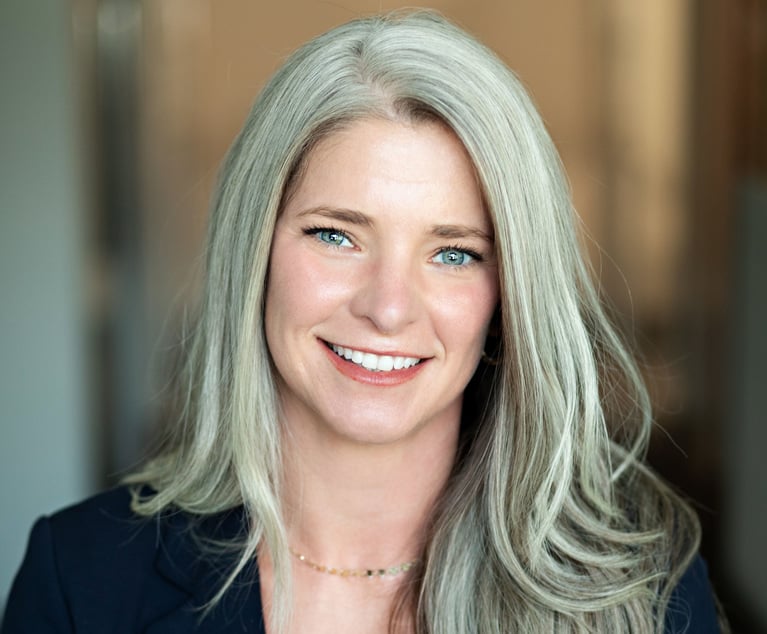 i_frontier/iStockphoto.com
i_frontier/iStockphoto.com'Ban-the-Box' Enforcement Gains Steam. What Employers Need to Know.
Labor and employment perspective on several recent "ban the box" state attorney general enforcement actions.
August 13, 2018 at 04:27 PM
6 minute read
Aldo Group Inc. came under scrutiny in New York after an undercover investigator discovered that not only did the store's job application include a question about criminal background but a hiring manager reportedly said any candidate with a felony would not be considered.
These criteria, in addition to the alleged dissemination of information to hiring managers that felons need not apply, led to a fine from the New York Attorney General's Office in June, the latest in a string of enforcement actions from that office.
The international retailer of handbags and accessories paid $120,000, one of five recent New York attorney general settlements involving alleged violations of so-called “ban the box” regulations. The settlement also required the company to take steps to comply with state laws that prohibit discrimination against job applicants with criminal records.The Attorney General's Office has entered into agreements with Marshalls, Big Lots Stores Inc., Party City and Bed Bath & Beyond.
The New York law is one of dozens in states and cities around the country that restrict companies from asking job applicants about criminal records, particularly early in the application process. The law, on the books since 2015, requires employers to individually assess an applicant's criminal record and determine its relevance before rejecting the would-be employee. New York City has a similar ordinance. Massachusetts enforced its law for the first time recently.
Aldo, with 53 stores across New York state, said in a statement it has not conducted or used criminal background checks in its hiring process since 2015. It said the investigation revealed that New York state stores were distributing outdated applications, without the knowledge of the human resources team. Aldo said it updated its forms, pulled them from stores and circulated an updated application.
“The Aldo Group does not conduct criminal background checks or consider criminal background information in its hiring process, and is not aware of any applicant in the state of New York who was denied employment on that basis,” the company said in a statement. “While the company is in disagreement with most of the New York attorney general's findings, there is always more that an employer can do to ensure that it remains compliant.”
Thirty-one states and more than 150 cities and counties have adopted the “ban the box” laws that aim to eliminate the stigma associated with a criminal conviction. The National Employment Law Project estimated that nearly three-fourths of the country lives in a jurisdiction that has a rule restricting how companies can use criminal background checks as part of the hiring process.
Advocates contend questions about a candidate's criminal background create a bias against those applicants. Some employee advocates contend various laws do not go far enough in terms of enforcement. Management-side lawyers have argued the laws could place undue burdens on employers.
|Lessons for Employers
Many multistate-employers have eliminated across the board a criminal background question on job applications.
“We have reached a place where there are so many ban-the-box laws throughout the United states, it's become a very large minority,” said Joe Schmitt, a labor and employment shareholder at Nilan Johnson Lewis in Minnesota. “I flipped in the last two years—I used to tell clients to comply piecemeal and have a box and eliminate for others. Now, I say create a uniform policy avoiding the question.”
Despite the prevalence of state and local “ban the box” laws, there haven't been significant court cases to date, Schmitt said. New York in particular, he said, has been aggressive in its enforcement.
The agency's claims against Aldo showed one potential pitfall for companies—how much discretion managers have in the hiring process. “The New York attorney general is attacking Aldo on the grounds it provided too much discretion to people in the field to allow them to making decisions, as opposed to establishing strict guidelines,” Schmitt said. “The argument is that this leads to discrimination.”
➤➤ Get employment law news and commentary straight to your in-box with Labor of Law, a new Law.com briefing. Learn more and sign up here.
In 2012 the U.S. Equal Employment Opportunity Commission issued guidance on the use of arrest and conviction records in employment. That guidance was put on hold in early 2018 after the state of Texas sued in protest, and a federal court judge said the EEOC overreached in its demands to employers.
The Massachusetts state attorney general, Maura Healey, said in June that her office settled with four businesses and issued warning letters to 17 others for alleged violations. The Massachusetts law bans employers from asking about criminal records on job applications.
“These actions highlight that businesses operating in jurisdictions with ban-the-box laws must ensure that their prehiring practices comply with such laws or risk regulatory fines, not to mention public disrepute and potential civil liability,” Epstein Becker & Green associate Carly Baratt wrote in a blog post about the Massachusetts action.
Stephen Woods, an Ogletree, Deakins, Nash, Smoak & Stewart shareholder in South Carolina, said the patchwork of laws is a compliance headache for employers. He described some of the stricter laws as regulatory overreaching. Some employers, he said, create policies that group certain areas together, create a single national policy or develop policies on a state-by-state basis.
Penalties and enforcement vary depending on the jurisdiction. New York has shown it will push to make sure employers comply with labor regulations. Other states or cities have fines. Large companies have pushed for certainty, he said. “Ban-the-box has become a misnomer because what it really is, is a complicated set of restrictions,” Woods said.
This content has been archived. It is available through our partners, LexisNexis® and Bloomberg Law.
To view this content, please continue to their sites.
Not a Lexis Subscriber?
Subscribe Now
Not a Bloomberg Law Subscriber?
Subscribe Now
NOT FOR REPRINT
© 2024 ALM Global, LLC, All Rights Reserved. Request academic re-use from www.copyright.com. All other uses, submit a request to [email protected]. For more information visit Asset & Logo Licensing.
You Might Like
View All
Contract Software Unicorn Ironclad Hires Former Pinterest Lawyer as GC
2 minute read
How Amy Harris Leverages Diversity to Give UMB Financial a Competitive Edge
5 minute read
Auditor Finds 'Significant Deficiency' in FTC Accounting to Tune of $7M
4 minute read
Dog Gone It, Target: Provider of Retailer's Mascot Dog Sues Over Contract Cancellation
4 minute readTrending Stories
Who Got The Work
Michael G. Bongiorno, Andrew Scott Dulberg and Elizabeth E. Driscoll from Wilmer Cutler Pickering Hale and Dorr have stepped in to represent Symbotic Inc., an A.I.-enabled technology platform that focuses on increasing supply chain efficiency, and other defendants in a pending shareholder derivative lawsuit. The case, filed Oct. 2 in Massachusetts District Court by the Brown Law Firm on behalf of Stephen Austen, accuses certain officers and directors of misleading investors in regard to Symbotic's potential for margin growth by failing to disclose that the company was not equipped to timely deploy its systems or manage expenses through project delays. The case, assigned to U.S. District Judge Nathaniel M. Gorton, is 1:24-cv-12522, Austen v. Cohen et al.
Who Got The Work
Edmund Polubinski and Marie Killmond of Davis Polk & Wardwell have entered appearances for data platform software development company MongoDB and other defendants in a pending shareholder derivative lawsuit. The action, filed Oct. 7 in New York Southern District Court by the Brown Law Firm, accuses the company's directors and/or officers of falsely expressing confidence in the company’s restructuring of its sales incentive plan and downplaying the severity of decreases in its upfront commitments. The case is 1:24-cv-07594, Roy v. Ittycheria et al.
Who Got The Work
Amy O. Bruchs and Kurt F. Ellison of Michael Best & Friedrich have entered appearances for Epic Systems Corp. in a pending employment discrimination lawsuit. The suit was filed Sept. 7 in Wisconsin Western District Court by Levine Eisberner LLC and Siri & Glimstad on behalf of a project manager who claims that he was wrongfully terminated after applying for a religious exemption to the defendant's COVID-19 vaccine mandate. The case, assigned to U.S. Magistrate Judge Anita Marie Boor, is 3:24-cv-00630, Secker, Nathan v. Epic Systems Corporation.
Who Got The Work
David X. Sullivan, Thomas J. Finn and Gregory A. Hall from McCarter & English have entered appearances for Sunrun Installation Services in a pending civil rights lawsuit. The complaint was filed Sept. 4 in Connecticut District Court by attorney Robert M. Berke on behalf of former employee George Edward Steins, who was arrested and charged with employing an unregistered home improvement salesperson. The complaint alleges that had Sunrun informed the Connecticut Department of Consumer Protection that the plaintiff's employment had ended in 2017 and that he no longer held Sunrun's home improvement contractor license, he would not have been hit with charges, which were dismissed in May 2024. The case, assigned to U.S. District Judge Jeffrey A. Meyer, is 3:24-cv-01423, Steins v. Sunrun, Inc. et al.
Who Got The Work
Greenberg Traurig shareholder Joshua L. Raskin has entered an appearance for boohoo.com UK Ltd. in a pending patent infringement lawsuit. The suit, filed Sept. 3 in Texas Eastern District Court by Rozier Hardt McDonough on behalf of Alto Dynamics, asserts five patents related to an online shopping platform. The case, assigned to U.S. District Judge Rodney Gilstrap, is 2:24-cv-00719, Alto Dynamics, LLC v. boohoo.com UK Limited.
Featured Firms
Law Offices of Gary Martin Hays & Associates, P.C.
(470) 294-1674
Law Offices of Mark E. Salomone
(857) 444-6468
Smith & Hassler
(713) 739-1250






